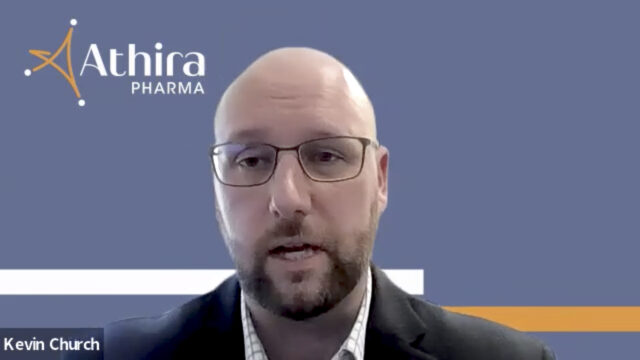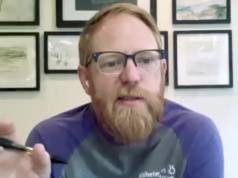Kevin Church, Chief Science Officer of Athira Pharma, joins Suzanne to provide an overview of what happens in a trial, how long they last, and the different kinds of clinical trials. In this segment, Kevin talks about how to find clinical trial locations, as well as what sorts of things the doctors are looking for in a participant.
Talk to your doctor or neurologist, or a specialist at a clinic, check clinicaltrials.gov for trials in your area, and for Athira Pharma trials see https://www.lift-adtrial.com/. You don’t need a doctor’s referral.
If you’re a caregiver or an adult child, if you’re interested in participating in a clinical trial, talk to a specialist to see if it’s appropriate. Talk to your doctor or neurologist, or a specialist at a clinic — visit clinicaltrials.gov for trials in your area, and the LIFT-AD Clinical Trial website for Athira Pharma’s trials. See AFE’s Alzheimer’s and Dementia page and AFE’s Athira Pharma podcasts page for more shows about these topics. Courtesy of Athira Pharma.
Suzanne closes out the show with Lucy’s story looking forward to springtime.
Suzanne: And welcome everyone to Answers for Elders Radio Network with Kevin Church, the Chief Science Officer of Athira Pharma Pharma, which provides clinical research and clinical trials for the forefront of this fight against Alzheimer’s disease. And I’m really looking forward to learning more as we move on into the world and working with you. You guys do a lot of work with doctors across the country, different types of studies that are going on based on all different types of brain type functions. We’ve been talking primarily about Alzheimer’s disease, but Kevin, you guys work with Parkinson’s individuals. What are some of the diseases that you work with on your, in your trials?
Kevin Church: So we have ongoing trials in Alzheimer’s and also an ongoing trial in Parkinson’s. And so our main focus is those two areas right now in the clinic.
Suzanne: What’s really interesting about this is really understanding that there’s a lot of things that can happen in the process of getting involved in an early trial. And you guys do trials all across the country. Tell us a little bit about how people can find information about the trials.
Kevin Church: There’s centers all across the country, mostly in major urban areas. For locations if it’s of interest, talk to your doctor to see if clinical trials are right. You can go to https://clinicaltrials.gov to look up the clinical trials in your area. Specifically interested in ours, you go to https://www.lift-adtrial.com/ and there is a list of sites. Mhm.
Suzanne: And so when they’re contacted, do they need a referral from their doctor?
Kevin Church: Typically for any trial, it starts the conversation with their medical provider or neurologist. Typically, I’ll just speak in general strokes, but typically, referrals aren’t needed. It’s patient-driven, if they’re interested, and they have to go through a screening process to see if they qualify. There’s certain criteria for any clinical trial to see if the patient meets… is the right type of patient, right diagnosis phase usually, either early or middle part of the disease, so there’s criteria like that that the patient has to qualify for. So usually there’s a screening step with a doctor at the site. And then there’s what’s called informed consent. So the patient’s given all the information that they could about the trial, about all the information about the different visits, and things like that. And they can make a decision whether it’s right for them at that point.
Suzanne: And then when they’re involved in a trial like that, usually the commitment, it depends on the condition. It depends on the type, is that the difference?
Kevin Church: Yeah, absolutely. It depends on the type of treatment, the disease that’s studying, and so they can vary in length anywhere from fairly short up to years in some cases. Some treatments are every day, some treatments are once a month. So, it just depends on the exact type of trial.
Suzanne: One of the things that’s really important about this is, when you go in for a trial, you have a say on what you’re gonna do to a certain degree, don’t you? As far as how long you want to be involved in or anything like that?
Kevin Church: Yes, you’re volunteers, you have the right to join or to not, and you also have — if you’re unable to continue, if you start a trial and unable to continue, of course, you can stop. That’s a personal decision, of course. Usually the the trials are set for a period of time. And so if it’s a nine-month trial then obviously the more people that can finish the nine months, the better, because then you can really understand exactly how the drug did over that period of time, where if people left early you might not get as good information. But it’s, of course, a personal decision for every patient and caregiver.
Suzanne: And there’s circumstances where you can’t continue, or maybe it’s not the right trial for them and that’s, that’s up to them. And obviously having a care partner go with you being involved in it, a care partner’s role would obviously be significant in that process.
Kevin Church: Absolutely. And sometimes even necessary. Some Alzheimer’s trials actually have assessments just for the caregiver, because it’s really important to get their perspective on how the patient is doing because at a visit, a doctor will see the patient for less than an hour, let’s say — I’m just making up a number, that’s probably pretty close. But the caregiver’s with them all the time and so getting their perspective: How are they doing over the last month? Were they able to dress themselves? Were they able to feed themselves? Those types of questions are really important for researchers because it gives us a view on really the entire time on how the patient is doing and not just this little one hour, or 30 minutes, with the doctor.
Suzanne: Also working with a doctor that works in this field of clinical trials, the great thing about that is this is somebody that totally understands the disease, much more than a general practitioner might. And the other side of it is is that you go to a doctor and like you said, it’s your visit, like 15 minutes, they’re not necessarily gonna know what questions to ask of the care partner or different things like that. So there’s a lot of advantages in having a greater understanding with families to participate in a clinical trial of sorts, wouldn’t you agree, Kevin?
Kevin Church: Yeah, there’s a lot of advantages. Some of the advantages could be you’re helping move the field forward, towards helping a greater number of people. You might also receive, potentially, you might receive benefit from therapeutic that’s being tested. You might not, that’s the point of the trial, is to determine if it’s gonna help or not. And you do receive medical checkups during the course of the trial. But of course, it’s a personal decision. There’s a lot that goes into it, but we, we in the industry appreciate the participants.
Suzanne: So I know that you have a list of locations on your website. Could you give that website out? And also the clinical trials?
Kevin Church: So any trials listed on https://clinicaltrials.gov, that’s managed by the government, that lists all clinical trials in your area. If you’re interested, it can be sorted by Alzheimer’s trials. Our trial is it https://www.lift-adtrial.com/, if you’re interested. But of course, talk to your doctor to see if any clinical trial is right for you.
Suzanne: Absolutely. And Kevin, it’s been great to have you on the show. I’m so glad that you were able to join us this week and I just, I encourage everyone go on to https://answersforelders.com, learn about all of our podcasts that we have from doctors that work in clinical trials. Thank you for being on the show.
Kevin Church: Thanks for having me. I really appreciate it.
. . .
Suzanne: I would like to thank our guest, Kevin Church, from Athira Pharma, talking to us about Alzheimer’s trials. And remember if you’re interested, go to https://www.lift-adtrial.com/ to learn more.
And I’m going to end today with a story as I always do every week. You see, it’s springtime and Lucy has spent her last 50 years in her home, looking forward to spring time. Her garden is in the backyard and it’s her happy place where every single day new surprises bloom, she looks forward to seeing which buds have appeared each day and which plants need tending to. So at 80 years old Lucy walks with a cane to her happy place. It’s early in the season and yes, there’s overgrowth and remnants of winter. Lucy does what she can, but she’s not as agile as she once was. One day by walking amongst her emerging greenery, she noticed new buds on her pies excitedly. She takes a step forward but trips loses her balance and tumbles to the ground. She wasn’t hurt, but she couldn’t stand up and she tried every which way, but she just couldn’t get back on her feet. And there she was in her garden, the one she loved so very much but alone, frightened and only the sweet smells of springtime to keep her company while she waited, feeling defeated
Over the next couple of hours, Lucy tried to stand again and again, yelling for help, hoping that someone would hear her. And finally, after what seemed like forever, a neighbor, who was taking a walk, heard her call in the distance. She followed Lucy’s sound and found her on the ground amongst her flowers unable to stand. And that neighbor immediately dialed 911.
Lucy had a few scratches, maybe a bruise or two, but her pride felt wounded but she realized that things could have been so much worse. What if I had broken my hip? What if I had hit my head? Yes, Lucy was lucky, but so many other seniors who are aging-in-place are not. So if you have a senior loved one who still lives at home, check in on them frequently. Don’t just call, show up, let them know that you’re close by and then be there, have a garden party to make outdoor areas enjoyable and safe. Ensure the outside areas are clear of overgrown vines and clutter, clean up decks and walkways, make sure that surfaces are not slippery. Pathways should be level and free of trip hazards, and don’t forget handrails on outdoor steps. And if your loved one enjoys their independence, like Lucy, then invest in a home, modern, tree system that extends to the outdoors. Over 80% of broken hips result from falls at home. Don’t expect your senior loved one to be lucky. Like Lucy, take steps to help them age in place safely indoors and out.
Until next week, everyone, be good to each other.











